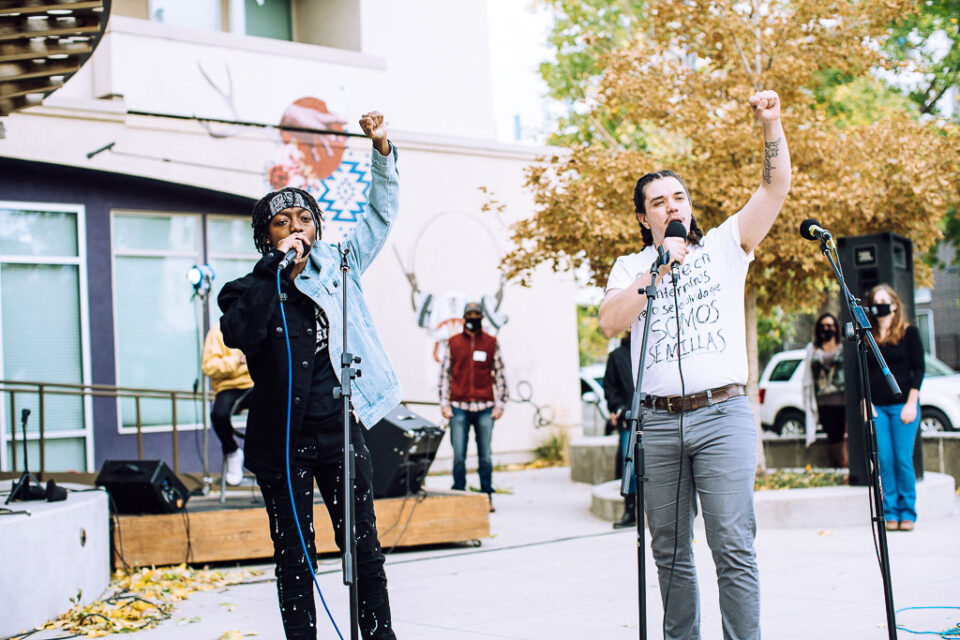
Youth on Record Teachers and Students Play On
How an arts education program meaningfully engages students during these uneasy times.
“The kids are all right. They need some love and attention, but they’re all right,” says Suzi Q. Smith, executive teaching artist for Youth on Record (YOR), an organization that hires local professional artists to educate and empower teens in some of Denver’s most vulnerable communities.
Smith, who has offered her voice in poetry and community organizing in Denver for more than 20 years, now teaches middle school students at Hill Campus of Arts and Sciences. In the fall semester, she instructed kids virtually five days a week, up to six hours per day. Fortunately, the pandemic’s disruption to physical gatherings didn’t affect student work — they’ve continued to produce poems, lyrics, screenplays, and epic odes, says Smith.
Production isn’t the main goal, however. While students gain knowledge and skills in literary devices, narrative, and critical thinking, they also connect on what it means to put themselves and their expression into a larger context.
“We feel as though with the classes we are providing, we’re trying to create an opportunity for dialogue with students; and in that dialogue, helping them answer questions of how they can become more free, how they can engage with experience, and how they can make different tools to help them navigate an oppressive situation,” says Stephen Brackett, co-founder of YOR, director of special programs, and MC of the band Flobots.
Smith begins her classes each year talking about privilege and equity; she approaches her teaching from a trauma-informed perspective — accounting for individual students’ life experiences, then making adjustments to provide a soothing experience. Her students are able to share who they are, whether they come from advantaged or underserved backgrounds.
Youth on Record teaching artists are leading students in 12 schools, mostly in Denver Public Schools and a few in Aurora Public Schools; a Poudre Valley partnership recently began. Partners for 2020/2021 include Colorado High School Charter Osage and GES campuses, Dr. Martin Luther King Early College, Legacy Options High School, North High School, DC 21, Aurora West College Preparatory Academy, Hill Campus of Arts & Sciences, Poudre Community Academy, P.R.E.P. Academy, and Third Way Center Joan Farley Academy. Though it usually takes a lot of administrative work, according to Smith, YOR has been able to embed artists as teachers of for-credit elective courses; occasionally the classes can count for an English or Ethnic Studies credit.
“When we started, I felt like we did a lot of code-switching where we would say certain things because we weren’t sure if the administration was ready for us to talk about liberation or abolitionist teaching models and a trauma-informed pedagogy,” Brackett explains. These educational values are backed by higher graduation rates, increased retention, and life-long learning and success, he says.
“We stopped code switching, but we also have gotten tighter about our practice because of the high quality that the teaching artists, artists like Michelle [Roquet], keep pushing for us to meet the needs of our students more and more.”
Michelle Roquet, beatboxer/vocalist for The Milk Blossoms and a teaching artist at YOR, instructs Legacy Options High School students in music production and spoken word poetry. Roquet found some difficulty keeping the relationship building and dialogue to the level it was before the pandemic. Some students are still doing quite well with their work, while others haven’t been in touch much since the spring.
“The struggles are unique to each student,” she notes. “The challenges are so individual because one-size-fits-all didn’t work before, it’s not going to work now. …There’s something complex and enriching happening in every individual life and I think that’s something easy to forget in the digital realm.”
In moments when she feels apathetic or hopeless, Roquet says she’s buoyed by her students opening up after a spark of interest, and the honest discussions they have as a result. Roquet also points to the organization’s November event, Founding Our Future: An Arts Declaration of What’s Possible, as a positive example of how artists were able to collaborate during these unprecedented times. Students and educators from schools that YOR works with—as well as other schools from around Colorado—took a virtual field trip to a concert that featured teaching artists, fellowship graduates, and friends in the music industry. The presentation gave testimony to the organization’s pursuit: turn the mic to young people, listen and learn from their experiences, and support their professional and personal growth.
YOR’s current objective, according to Brackett, is to help young people deal with being on the front lines of crisis; such as the pandemic and racial injustice. “Our young students bear the brunt of it,” he says.
Smith sees her job as being a guide to help young people find their voices and their identities; to “know that their creations from that place are powerful and deserve to be celebrated and heard,” she says. The awareness and respect built between the students shows how positively generative her mission is. She watches middle school kids share their work every Friday and exchange genuine compliments. It makes her feel “weepy,” she says. “They’re so good at it.”
Get involved: Educators or parents interested in Youth on Record partnered musicians giving guest workshops in their schools can contact Stephen Brackett (Stephen@YouthonRecord.org).





